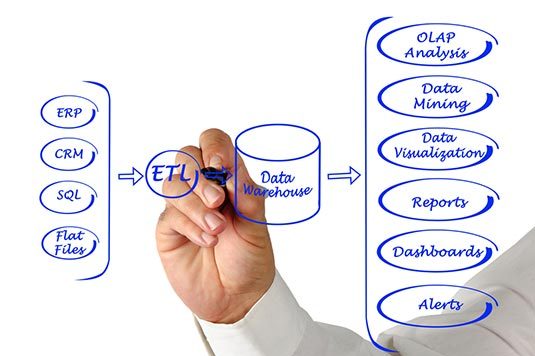
Data Integration is fundamental to enterprise information management/data warehousing initiatives. An effective data integration strategy, architecture, and supporting infrastructure and processes are vital components in the delivery of analytic solutions. While Extract, Transform and Load (ETL) is still a commonly used technique for data warehouse focused data integration, the evolution of technology coupled with the increasing sophistication of data consumers has driven the increasingly complex nature of data integration. The accelerating end-user demand for “real-time” data increases the demands on a data integration infrastructure, while scorecards and dashboards increase the expectation of seamless visibility into data.
As the capabilities of technical infrastructure have increased, initiatives like Enterprise Information Integration (EII), Enterprise Application Integration (EAI), Master Data Management (MDM), and Product/Customer Data Integration (PDI/CDI) are viable components of EIM. Destiny Corporation provides expertise spanning the continuum of data integration.
OUR CONSULTING SERVICES ADDRESS THE WHOLE LIFE CYCLE OF ENTERPRISE DATA MANAGEMENT SOLUTIONS, INCLUDING:
- Data Architecture – Optimizing database availability and usage based on an understanding of business information needs, logical and physical data modeling, and other activities
- Data Governance – Maintaining principles, policies, procedures and standards for the effective use of data
- Data Integration – Using ETL/ELT processes to create a consistent, relevant, and trusted view of data across business units and subject areas
- Data Quality – Assessing whether current data assets are fit for their intended use
- Data Security and Privacy – Ensuring regulatory compliance across data subject areas, including monitoring and audit capabilities
- Data Stewardship – Orchestrating the day-to-day activities of creating, using and retiring data
- Master Data Management – Creating consistency in reference and relationship data regarding product, customer, supplier and organizational issues
- Metadata Management – Organizing the people, processes, and technical components needed to ensure that metadata is easily accessible, consistent, current, accurate, and complete
- Unstructured Data Integration – Extracting meaning from text using various linguistic techniques, adding structure and blending it with numerical data for analysis

